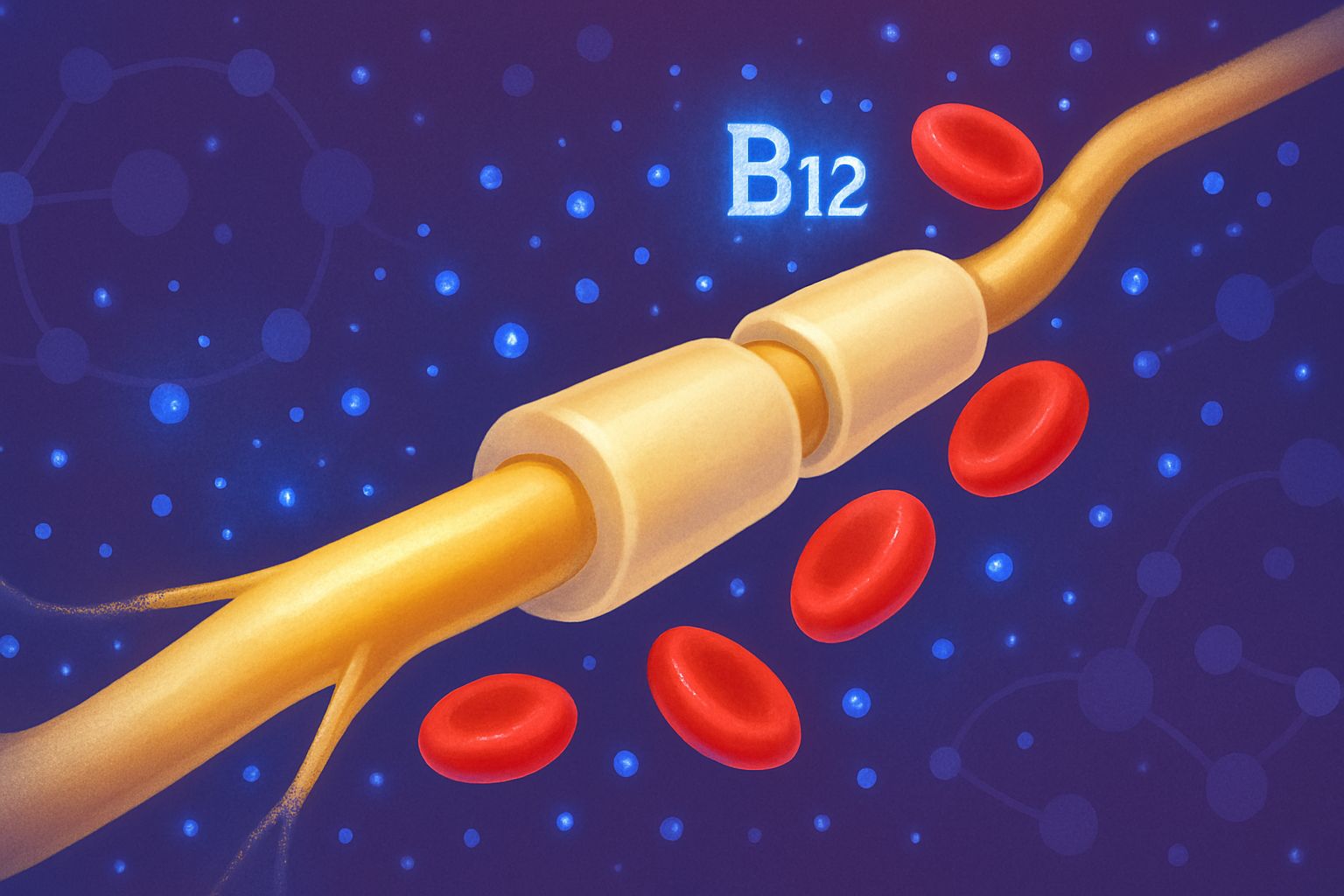Vitamin B12 and the nervous system - what are the relationships?

Of all the B vitamins, B12 is the one most strongly associated with brain health. In fact, it is of momentous importance for the entire nervous system, and at every stage of life, from the fetal stage to late old age. Let's find out exactly how vitamin B12 works on the nervous system and who needs its supplementation most.
- What is vitamin B12?
- Vitamin B12 deficiencies
- Effects of vitamin B12 on the nervous system
- Vitamin B12 and fetal development
- Vitamin B12 and neuronal myelination
- Vitamin B12 and the preservation of cognitive function
- Interaction with folic acid
- Symptoms of vitamin B12 deficiency
- Different forms of vitamin B12
- Dosage of supplements with vitamin B12
- Sources of vitamin B12 in the diet
What is vitamin B12?
Vitamin B12 is also known as cobalamin. It is a very complex structure containing a cobalt atom in the center. Its main functions in the human body are to support the methylation process and the Krebs cycle. In medicine, it is mainly known as a tool for anemia and neurological disorders.
B12 is produced by bacteria. Its production occurs largely in the intestinal microbiome of animals, which is why animal products are the source of B12 in the diet, with meat and offal far outweighing other foods. Unfortunately, there is no notable plant-based equivalent. Small amounts of vitamin B12 analogs are found in mushrooms and seaweed, but studies show that they are not active for humans.
Vitamin B12 deficiencies
Vitamin B12 deficiency is unfortunately quite common. It is due to both insufficient intake of products that are its source and to malabsorption.
Insufficient supply occurs mainly in people who either consciously follow plant-based diets or simply shun meat and zoonotic products. Malabsorption, on the other hand, can occur, for example, in seniors, who often have impaired gastric acid production, or people who chronically use gastric acid antacids. Drugs that deplete B12 stores also include metformin, nitrous oxide and some antiepileptic drugs.
Diagnosing vitamin B12 deficiency, however, is not as easy as one might suspect. Vitamin B12 levels tested in the blood alone do not always provide a clear answer. While a low serum level of it more than likely indicates a deficiency, a normal B12 level in a test is not enough information to rule out subclinical deficiency.
Subclinical vitamin B12 deficiency is the most difficult to detect. To accurately assess the status of vitamin B12 in the body, several more advanced blood tests would need to be performed:
- methylmalonic acid
- homocysteine
- holo-transcobalamin
These 3 tests, combined with the traditional serum B12 concentration test, give a pretty precise picture of whether the body has the ability to utilize adequate amounts of this vitamin.
Effects of vitamin B12 on the nervous system
The nervous system needs vitamin B12 for a number of reasons. Its limited availability, whether due to too little intake or problems with its absorption or metabolism, results in many disorders. Let's examine in more detail how B12 affects the nervous system.
Vitamin B12 and fetal development
This vitamin is critical for the development of the nervous system in fetal life. Its deficiency increases the risk of neural tube defects, as with folic acid deficiency. An adequate supply of B12 is necessary for efficient DNA synthesis and thus cell replication. Low B12 availability increases the risk of neural tube defects 2-4x. Pregnant women are one of the most vitamin B12-needy populations. During pregnancy, it's worth looking at your diet to see if it provides adequate amounts and its status in blood tests, and include appropriate supplementation if necessary.
Vitamin B12 and neuronal myelination
Myelin sheaths on neurons are a kind of physical and chemical barrier that protects the nerve cell from various types of damage. The good condition of myelin sheaths improves the overall function of the nervous system and reduces the risk of degeneration.
B12 is a well-known cofactor in the formation of myelin, and additionally has supporting immunomodulatory and neurotrophic properties. Thanks to these properties, it has gained considerable interest in the context of multiple sclerosis, which is an autoimmune disease in which myelin sheaths, among other things, degenerate. Studies have noted that there is a markedly higher percentage of vitamin B12 deficiency among people with multiple sclerosis.
Vitamin B12 and the preservation of cognitive function
B12 is a very senior-friendly vitamin. Not only do they statistically have more frequent deficiencies and are more in need of supplementation, but it also supports many elements of health that often begin to pose a problem in old age.
Studies of plasma B12 levels alone have yielded mixed results, but with more specific diagnostics (including methylmalonic acid), it has been noted that vitamin B12 deficiency is associated with cognitive decline and a higher risk of Alzheimer's disease.
Interaction with folic acid
Vitamin B12 participates in the metabolic cycle of folic acid. It is so important that B12 deficiency can result in functional folic acid deficiency, even when adequate amounts are provided. This is because without B12, the body is unable to benefit from the proper actions of the biologically active form of folic acid. Vitamin B12 in this case is the limiting factor, so its deficiency has widespread consequences.
The inability of B12 deficiency to utilize folic acid leads to decreased stability and inhibition of DNA repair and gene expression/transcription, which can impede neuronal differentiation and repair, induce hippocampal atrophy, demyelination and impaired integrity of membrane phospholipids.
Symptoms of vitamin B12 deficiency
They mainly include neurological and psychiatric symptoms and changes in blood count. The former, however, appear much faster, so symptoms from the nervous system can be expected even before any blood changes appear.
If you are experiencing chronic fatigue, cognitive decline, worse mood, etc., it is worth checking your vitamin B12 status.
Different forms of vitamin B12
We know of 4 main forms of cobalamin, and below is a brief description of them.
Cyanocobalamin - the most common and ridiculously cheap form of B12. It is used in economical dietary supplements, some drugs and for food fortification. It also occurs naturally in this form in trace amounts in food. Easy availability is an advantage, but not everyone will be served by this form. Cyanocobalamin is not the active form, and must first be converted in the body to the appropriate coenzymatic form to take effect.
Methylcobalamin - the active form of vitamin B12 with a methyl group. Its popularity has grown strongly in recent years. The popular belief is that this is the best form for people with methylation disorders and those who tolerate cyanocobalamin poorly or are dissatisfied with its effectiveness.
Hydroxycobalamin - an inactive form of B12, but nevertheless well utilized by the body and used in some medications, including those given by injection. Safe for people with poor tolerance to substances that are methyl group donors.
Adenosylcobalamin - the other active form with a slightly different action profile than methylcobalamin, as they act at different sites. The combination of these two forms could potentially give more comprehensive results. It is a good alternative to methylcobalamin when you need to limit your intake of methyl group donors.
Dosage of supplements with vitamin B12
The recommended intake of vitamin B12 is 2.5 mcg. Such a dose is contained in the simplest and cheapest B-Complexes and multivitamins. To achieve real health benefits, however, much higher doses are most often needed.
According to the official recommendations of the Dietary Supplement Panel appointed by the GIS, the maximum dose of vitamin B12 in supplements should be 100 mcg. This is 4000% of the RWS for this vitamin. Often, this is the dose that gives good results when one needs to make up for a deficiency or benefit from the properties of vitamin B12.
In specific cases, when B12 is to serve a typically therapeutic purpose, even higher doses of vitamin B12 are used. It is not uncommon for this to be as high as 300-1000 mcg per day.
Sources of vitamin B12 in the diet
In terms of sources of occurrence, vitamin B12 stands out from other B vitamins. Well, we look in vain for good sources of it in plants. In the diet we get it from zoonotic products, mainly meat.
People on a vegan diet should definitely supplement vitamin B12. Symptoms of its deficiency are not immediately apparent after changing to a plant-based diet, but they can appear even after a few months or so, when the supply in the liver is depleted.
It may not be directly related to diet, but our intestinal bacteria can also be a source of vitamin b12. Some species of bacteria inhabiting the intestines have the ability to produce cobalamin, which can then be assimilated into the bloodstream. Therefore, it is extremely important to take care of the condition of the gut and the good composition of the microbiome.
Sources:
 ⮜ Previous article
⮜ Previous article
PQQ as an antioxidant to increase mitochondria
 Next article ⮞
Next article ⮞